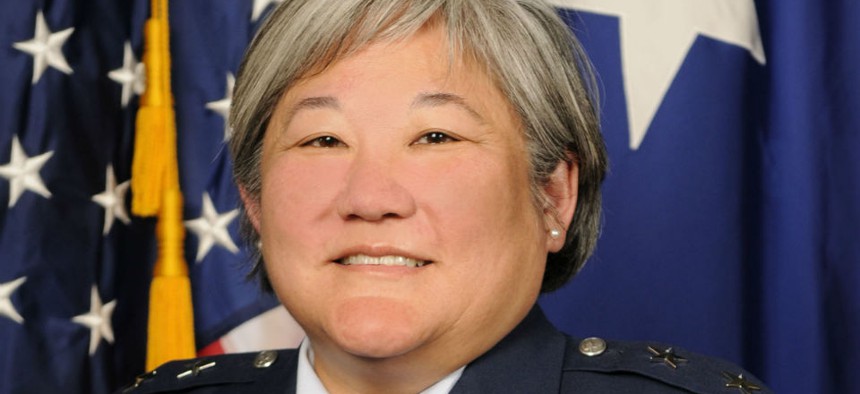
Maj. Gen. Susan Mashiko Air Force file photo
Air Force General Misused Government Limo Privileges
Pentagon watchdog finds 107 trips by Maj. Gen. Susan Mashiko were not for official business.
The former deputy director of the National Reconnaissance Office violated laws and regulations by using government cars and drivers for non-official Washington-area travel, the Defense Department inspector general determined.
Maj. Gen. Susan Mashiko, who was also commander of the Air Force Space Command Element, misused a government vehicle “for travel on part of the route between her residence and NRO Headquarters and for travel to and from airports in the National Capital Region,” the IG wrote in a report dated Nov. 7, 2013, and released on Monday.
A probe of her calendar and desk logs along with interviews showed that Mashiko was the senior passenger on 196 occasions; of these, only 89 trips had an official purpose, the IG found. That left 107 nonofficial trips, including travel to airports, for which the car service is not authorized except in cases of emergency.
What’s more, Mashiko’s residence is located too close to her office at NRO headquarters in Chantilly, Va., for her to qualify for limo service for her daily commute, investigators determined. “Although Maj. Gen. Mashiko was authorized the use of a [government vehicle] to return to her place of duty . . . after attending meetings or events at locations outside of NRO [headquarters] or to attend medical and dental appointments,” the report said, her use of the Pentagon as a dropoff point was improper. Likewise, she was not eligible to use a permanently closed U.S. Post Office, located half a block from her residence, as a pickup and drop-off point for various trips.
The daily 28-mile commute between NRO headquarters and her Pentagon office resulted in unnecessary government-provided travel, the report said, “and executive driver usage that could be characterized as a personal limousine service.” Mashiko had been assigned a parking place at both locations.
The NRO, which has 3,000 employees working on satellite intelligence, is staffed jointly by the military, the CIA, and Defense civilians.
Through her attorney, Mashiko responded to the accusations in an Oct. 21 letter summarized in the IG report. She assumed “full responsibility for the circumstances,” saying she should not have relied on precedent and regretted not consulting with the NRO Office of General Counsel. Mashiko pointed out, however, that NRO lacked written guidance on vehicle use by executives and that she altered her practices after problems were pointed out.
“After carefully considering Maj. Gen. Mashiko’s response, we stand by our conclusion,” the IG wrote. “We recommend the Secretary of the Air Force consider appropriate action.”
Mashiko retired on July 1, according to her bio on the Air Force website.







